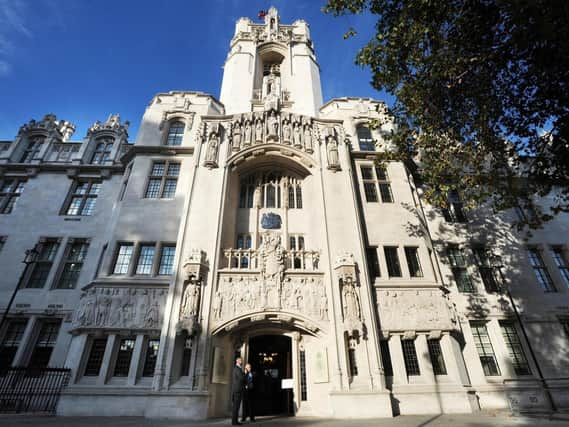Ben Lowry: Do not expect unionists to cheer the anniversary of the 1998 Belfast Agreement


In a letter seen by BBC NI, Chris Heaton-Harris wrote to the political parties that such a restoration of the assembly would be “the most straightforward path to progressing this important legislation”.
Dáithí’s Law is named after Dáithí Mac Gabhann, age six, from Belfast, who needs a heart transplant. His plight has helped to secure cross-party political support for a system of ‘presumed consent’ in organ donations, rather than one in which you specifically have to register your consent for your organs being used if you die.
Advertisement
Hide AdAdvertisement
Hide AdI have long supported a system of deemed consent. One reason is that my own aunt had a heart transplant in Newcastle Upon Tyne in the 1990s, which heightened my sense of awe that such a procedure is even possible.


Another is that as I have got older I have come to see how people do not get around to vital things such as drawing up a will, even though they might intend to do so for years. Most of us live day-to-day without any real fear that we will die soon.
There is a further reason why I take an interest in organ debate. For two decades I have written about road death statistics in Northern Ireland, which have relentlessly fallen over the last 50 years. Car travellers are 90% less likely to die in such an accident than they were in the 1970s. Many factors, from seat belt laws to speeding enforcement to better car design to better driver training, have made the roads far safer than they were. Accidental death is less common in other risk areas of life too.
This is human progress, but with a notable downside – vital organs become available less often than they once did.
Advertisement
Hide AdAdvertisement
Hide AdYet while I back Dáithí’s Law it was troubling to hear Mr Heaton-Harris link the passage of that legislation to the stalemate at Stormont. His government did not hesitate to step in at Westminster to legalise abortion.
Contrast this pressure on the DUP with the way that UK ministers failed in three years to put pressure on Sinn Fein for keeping Stormont down until they got an Irish language act. In fact they would not even criticise Sinn Fein. In 2018 I asked Theresa May about Sinn Fein’s then boycott and she actually praised the party (this web version to this article links to her comments, see below).
London’s increasing pressure on the DUP to resume mandatory power-sharing with Sinn Fein, a party that does not want Northern Ireland to exist, is all the more remarkable given that the UK government has, intermittently, said it shares unionist concerns about the Irish Sea border. At one stage ministers seemed to be pausing government opposition to the unionist legal challenge to the protocol (that last week was rejected at the Supreme Court).
Incidentally, have you noticed how the hysteria over the appointment of Mr Heaton-Harris and Steve Baker as ministers here has evaporated? Some of us smiled wrly at the scathing nationalist talk of a eurosceptic takeover of the NIO. We knew that that department would never become overtly pro UK. And guess what? All those who expressed outrage at the new arrivals have long since fallen silent.
Advertisement
Hide AdAdvertisement
Hide AdThe aforementioned legal challenge was an example of a (badly-needed) combined response to one of the many threats to the Union. The people involved, David Trimble, Jim Allister, Arlene Foster, Jeffrey Donaldson, Steve Aiken, Kate Hoey have at times bitterly disagreed with one another but came together with the assistance of the former MEP Ben Habib.
Last week the Supreme Court found in favour of the protocol. It did so unanimously. Not one justice was concerned at the way in which minority safeguards have been discarded for the protocol, or about the way trade between NI and Great Britain has been disastrously impeded, or about the implications for the principle of consent.
Some legal and commentary voices mocked the challenge. On these pages we have carried arguments for and against those unionist legal tactics (see links below).
But if you zoom out a bit from this saga, you see stark double standards in how the UK reacts to Sinn Fein, a party which it is determined to keep in the mainstream political process, compared to how it reacts to unionists.
Advertisement
Hide AdAdvertisement
Hide AdIn another display of those double standards, the UK establishment would not dare amend the outworking of the Belfast Agreement in a way with which nationalists were unhappy, as is now threatened to unionists so that the government can remove any DUP influence.
Nor would it so much as contemplate an end to mandatory coalition if nationalists were in the minority.
The 25th anniversary of the Belfast Agreement is weeks away. The UK clearly hopes for a deal before then (although everyone who knows what is going is tight-lipped and thus all ‘informed’ reports on the nature of an impending deal are in fact speculation).
I wonder why London places so much store by that April anniversary of 1998.
Advertisement
Hide AdAdvertisement
Hide AdWill unionists go back to Stormont? I don’t know. All options look poor. But, please – do you really think after what has happened unionists are now going to celebrate the Good Friday accord?
I strongly supported that deal, as did this newspaper (long before I had any link to it). But regardless of what the Supreme Court says, it seems obvious to me that, as John Larkin KC put it, the principle of consent now amounts only to the final transfer of sovereignty. You can chip, chip, chip away at the Union with little legal or political impediment.
No unionist is going to cheer about such a state of affairs.
Ben Lowry (@BenLowry2) is News Letter editor
Ben Lowry in 2018: The sorry signs of a weakened PM and a weakened unionism
Advertisement
Hide AdAdvertisement
Hide AdProtocol challengers: UK’s highest court has confirmed our fears about the impact of the Irish Sea border